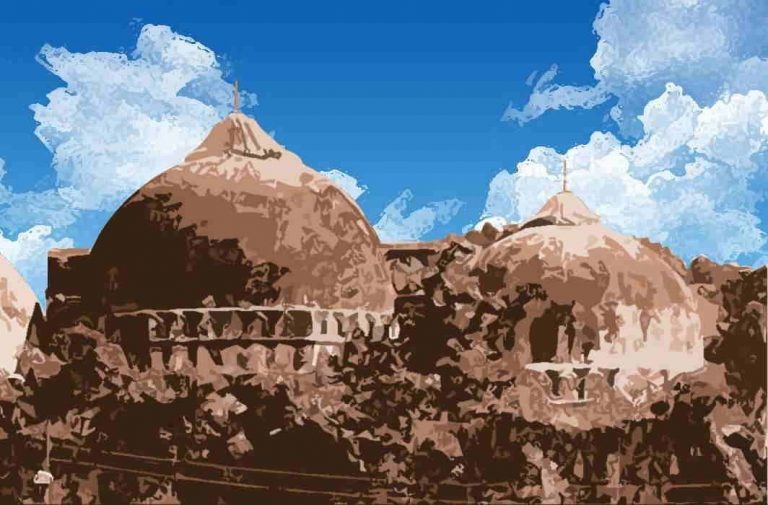
The Ismail Faruqui verdict had said mosque not essential for offering namaz, Supreme Court says view won’t affect Ayodhya outcome
A three-judge bench of the Supreme Court, headed by Chief Justice Dipak Misra, on Thursday (September 27) refused to refer its 1994 Ismail Faruqui verdict to a larger bench for further clarification.
The Ismail Faruqui verdict, delivered by a Constitution Bench, had been challenged by a bunch of Muslim outfits during proceedings in the Babri Masjid Ram Janmbhoomi title suit who had claimed that the top court’s observation in 1994 – that mosques are not integral to Islam and thus not a prerequisite for offering namaz – was too “sweeping” and could influence the verdict in the extant land dispute.
The bench, also comprising Justices Ashok Bhushan and S Abdul Nazeer, gave a split verdict with Chief Justice Dipak Misra and Justice Bhushan holding that there was no need to refer the Ismail Faruqui verdict to a larger bench, while Justice Nazeer gave a dissenting opinion, stating that whether a mosque is integral to Islam or not is a matter that requires to be considered by a Constitution Bench.
The verdict by a 2-1 majority concludes that the Ismail Faruqui verdict does not need further consideration of a larger bench. However, Justice Bhushan who authored the verdict on behalf of himself and Chief Justice Misra made it clear that the precedents set in Ismail Faruqui were solely on the issue of acquisition of land by the government and will not, in anyway, impact the outcome of the Ayodhya land dispute which would in turn be decided on its own merits.
Hearing in the title suit will resume from October 29.
The Ismail Faruqui verdict; 1994
Months after the demolition of the Babri Masjid in Ayodhya in December 1992 by Hindu radicals supported by the RSS-BJP combine, the Congress-led central government has enacted the Acquisition of Certain Area at Ayodhya Act, 1993. A year later, in October 1994, a five-judge bench of the top court had, in the M. Ismail Faruqui Vs. Union of India case, upheld the validity of the Act, vesting jurisdiction of the disputed land in Ayodhya to the Centre.
The fine print of the top court’s verdict, however, gave rise to a new legal conundrum that now, in hindsight, appears to be a critical legal precedent that has the potential of determining which way the judgment in the Babri Masjid-Ram Janmbhoomi title suit could go. Paragraph 82 of the Ismail Faruqui verdict states: “there can be no reason to hold that a mosque has a unique or special status”. The interpretation of this line has been taken, especially by the Hindu right that wants control of the disputed land to build a Ram Mandir, to be that the presence of a mosque was not a prerequisite for Muslims to offer namaz. Additionally, it meant that the government was free to acquire the disputed land on which the Babri Masjid once stood and that a mosque – irrespective of its heritage value or the significance and faith attached to it by the Muslims – held no importance in Islam.
Several Muslims groups who are now party to the long running Babri Masjid-Ram Janmbhoomi title suit had petitioned the Supreme Court to review the Ismail Faruqui verdict on grounds that its reference to the irrelevance of a mosque for offering namaz was a “sweeping observation” and needed reconsideration as “it will have a bearing” on the final outcome of the land dispute.
The Uttar Pradesh government, along with Hindu outfits that are party to the title suit, have opposed the petitions that seek referring Ismail Faruqui to a larger bench. Their resistance is based on the argument that the Muslim outfits were raising the matter belatedly – nearly 25 years after the Ismail Faruqui verdict was delivered – with the sole purpose of delaying the judgment in the land dispute. Among the arguments made by counsels for the UP government and the Hindu outfits while placing reliance on Ismail Faruqui is that while the birthplace of Lord Ram cannot be shifted to another site, a mosque with no particular religious significance to the Muslims can be shifted as doing so will “not affect the right to practice religion by offering ‘namaz’ in other mosques”.
Countering these arguments, senior advocate Rajeev Dhavan, appearing for some Muslim petitioners in the title suit, had told the Supreme Court that the Ismail Faruqui verdict had failed to take note of the two critical issues – one, that the idols of Ram Lalla were placed in the disputed premises through an illegal act of trespass and two, the 1986 order by the Rajiv Gandhi-led central government to open the locks of the Babri Masjid premises and allowing the shilanyas was based was on the plea of a person who was not a party in the case and should not have been entertained. Dhavan had also submitted that the Ismail Faruqui verdict was “bad in law” as denied members of one religious community their fundamental right to the freedom of practicing their religion while upholding the same right for the members of another faith.
THIS IS A FIRST DRAFT, THE STORY WILL BE UPDATED WITH DETAILS OF THE VERDICT SOON
— India Legal Bureau

